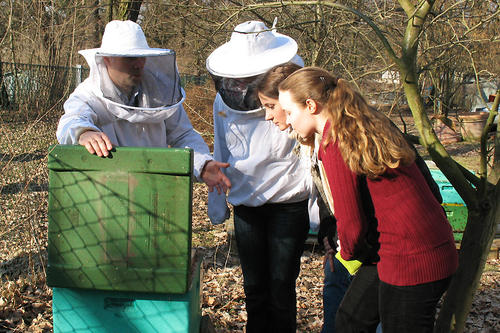Studying Bees in Düppel
As soon as air temperatures rise to 8°C (46°F), bees take to the air.
Mar 24, 2011
Checking the beehive: Professor Ralf Einspanier explains the structure of the hive to doctoral students Katrin Miessen (wearing beekeeper protection), Katja Hasse (2nd from right), and Martine Bittel (far right).
Image Credit: Anja Matys
Alongside horses, cows, sheep, and pigs, honeybees are also a productive kind of animal. The flying pollinators ensure high yields for crops and fruit. At the Düppel campus of Freie Universität, students of veterinary medicine can now learn everything they need to know about beekeeping and honey production up close and personal, right at the beehive.
When, as now, the first signs of nice weather begin to emerge in the springtime, students aren’t the only ones on the Düppel campus to be happy about the mild temperatures. “On a sunny day, when the air temperature rises above 8°C (46°F), the bees start to fly out of their hives after the winter break,” reports Professor Ralf Einspanier of the Institute of Veterinary Biochemistry at Freie Universität. “This year, the first flights were observed as early as mid-January.” The occasion marks the time when the bees start out on their “cleaning flight,” when all of the digestive residue that has accumulated over the winter is excreted. Drivers may be familiar with the results: tiny, dark yellow dots that stick to the windshield on days like this.
Professor Einspanier took charge of Freie Universität Berlin’s four beehives on the Düppel campus last September. He receives efficient, effective support from Benedikt Polaczek, who holds a doctorate as a master beekeeper, at the bee yard kept by the Department of Biology. “Veterinary medicine students who are interested can learn how to deal with and care for beehives hands-on here, expanding their knowledge regarding bees as a useful animal,” Einspanier says.
All over the world, bees are tremendously important. Their diligent pollination activities help ensure plant species variety – and with it, the variety of the foods we eat. The Economics of Ecosystems and Biodiversity (TEEB) study, published under the auspices of the United Nations Environmental Programme (UNEP), put the global economic value of the harvests attributable to bees and other pollinators at 150 billion dollars each year.
For several years, though, bee colonies all over the world have been experiencing mysterious “die-offs,” which have often devastated entire crops. The European Union is among those viewing these developments with alarm. There are plans for various actions, including the creation of an EU Reference Laboratory in the area of bee health, which will coordinate scientific data and facts among the member states and investigate possible causes of sickness affecting bees.
The diligent honeybees on the Düppel campus can give budding veterinarians their first look at the highly complex functioning of a bee colony. “Hands-on work with the bees is also sure to provide impetus for exciting research questions,” says biologist Einspanier, a fan of the bees. “And maybe we’ll also have a couple of students get excited about beekeeping.” A good thing, since a new generation of beekeepers is urgently needed. There are plans to teach students how to produce the university’s honey in a future working group or as part of a thematically related seminar. The bees delight the department with many kilograms of honey each year. Honey from the Düppel campus will also be for sale during the campus open house on June 25.
Further Information
- Prof. Ralf Einspanier, Dept. of Veterinary Medicine, Institute of Veterinary Biochemistry
Tel.: 49 (0)30 / 838-62575, Email: einspani@zedat.fu-berlin.de

